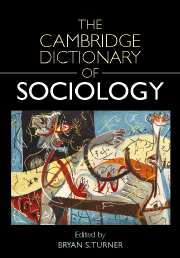Q
Published online by Cambridge University Press: 22 October 2021
Summary
qualitative data analysis
– see qualitative research.
qualitative research
These methods are comprised of a diverse array of epistemological orientations (such as positivism, realism, and social constructionism), data gathering techniques (for instance participant observation, interviews, audio and video tape recording, and textual analysis), and analytic procedures (for example, grounded theory, analytic induction, or negative case analysis). While they share a general regard for the subjective dimensions of social life, qualitative research methods are also marked by significant divergences and sometimes even disputes among their various practitioners. These divergences and disputes are best understood as a reflection of the maturation and flourishing of qualitative social science rather than any failure to develop beyond pre-scientific or pre-paradigmatic disagreements.
Whereas sociological research that employs numerical approaches to the collection and analysis of data tends to emphasize objective social structures and their objective relationships with one another, qualitative research methods tend to emphasize the subjective meanings social actors find in their lives and the interactional processes through which they engage one another and the wider world. Qualitative research is overwhelmingly predicated on the presumption that meaning and human practice merit scientific interest as important phenomena in their own right and not merely as reflections of more general and anonymous social structural relationships. Though this presumption hails from a variety of distinct historical sources, its most commonly cited source in the annals of social science history is the Methodenstreit, or “dispute over method,” which took place in late nineteenth-century Germany.
The Methodenstreit came to embroil some of Germany's finest social thinkers in debate concerning the specific nature of social life and its amenability to the methods of analysis found in the physical sciences. Thinkers like Wilhelm Dilthey (1833–1911), Hans-Georg Gadamer, Georg Simmel, and Max Weber became figureheads for an intellectual movement that sought to distinguish the social sciences decisively from the physical sciences, on the grounds that their methods and/or subject matters were irreducibly unique. Scholars argued that whereas physical scientists study lower life forms and inanimate objects, social scientists study people. Unlike the behavior of inanimate objects or lower life forms, the behavior of human beings is not caused by uniform laws but by sentient, creative subjects imbued with an understanding of the worlds within which they live and act.
- Type
- Chapter
- Information
- The Cambridge Dictionary of Sociology , pp. 484 - 489Publisher: Cambridge University PressPrint publication year: 2006



